Time to learn a lesson: it's the Don't be a Racist Blog.
By Video_Game_King 12 Comments
Fire Emblem: Radiant Dawn
( I know I've stated this several times before, but I love Fire Emblem.) Seriously, just about everything in a Fire Emblem game stands as a testament to why video games are awesome. The deep, intricate stories; the rewarding, tactical gameplay; the well-rounded, human characters; those who would find fault with these are banished from my kingdom. *loses half my readers* Crap. Anyway, this all puts me in an awkward position, as Radiant Dawn, the most recent game in the series if you don't count Shadow Dragon for incredibly stupid reasons, hasn't received decent reception. However, I've learned that most gamers are usually wrong ( oh so wrong), and this is no exception; Radiant Dawn is actually a good game, despite what most people say. It's not as good as previous Fire Emblems, but damn it, it's good!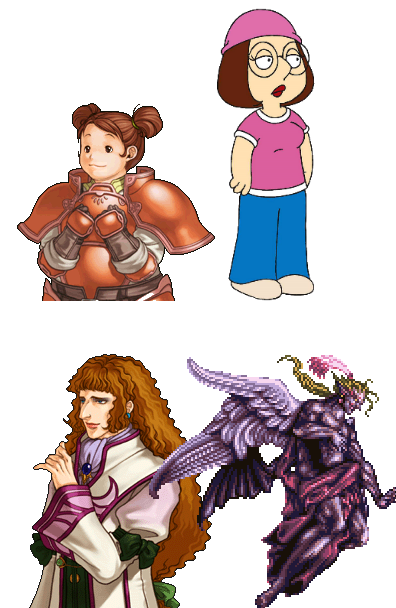
To its credit, though, Radiant Dawn also does some pretty creative things with both the gameplay and the story. Back to the villain thing, sure, the regular baddies are shallow, but it does a decent job of pitting your parties against each other for a cool virtual villain thing. Yet what works as a story element may not necessarily work as a gameplay element; sure, it sounds cool to fight against your former troops (and it is, trust me), but given that they're exactly the same as before, the army that allowed you to blaze through 900 enemies in half a turn now forces you into twice as many resets. It is for this reason and several others that I found the difficulty curve to spike up and down between chapters. Perfect example: there was this one chapter where I had to kill a certain number of enemies. Sounds fair, but what made it slightly difficult were their strength and the surrounding darkness. However, I managed to surmount it and move onto a chapter where I had to survive an enemy onslaught for twelve turns. Perhaps onslaught isn't the right word, since there was a giant river that prevented them from moving quickly and en masse. It certainly didn't help that their entire army was water soluble, either.
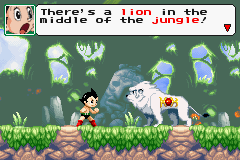
Despite the frantic difficulty curve, I'd say that this game is slightly easier than oth-I just realized that I went three very long paragraphs without once mentioning the basic gameplay of Radiant Dawn. It's a grid-based/turn-based system where you all your units, attack enemies/do non-attacky things, and then they do the same. Repeat until victory, just like every other Fire Emblem. Strong base, but how does Radiant Dawn build upon that? First, you have the return of the the Manimal-esque laguz, which also means the return of the incredibly forced racial lessons. It's not as bad Path of Radiance was, though, since most of the characters are no longer racist; in fact, the new message in RD is that it apparently sucks to be Barack Obama (but more on that later), a message delivered about once or twice. Compare this to Path of Radiance, where you spent an entire chapter learning that racism is bad and that we're all equals and that apparently not all of these messages end with a group of people yelling, " G-I JOEEEEE!!"
Anyway, the laguz also have some neat abilities specific to them, like countering ranged attacks or tearing the piss out of their foes. Speaking of abilities, the well-rounded ability system of Path of Radiance returns with absolutely no changes, if my memory serves me correctly. I'm not insulting it by saying it changes little; I'm insulting it by saying that most of the abilities you get later in the game are incredibly superfluous. Why do I need five hits when I can already kill the guy with two? Why do I need to put them to sleep when they'll be taking a dirt nap in five seconds anyway? Why do I need to suck away their HP and add...OK, that one actually makes a lot of sense, but my point is that the ones near the end of the game don't; my units are already powerful enough without the abilities. Hell, they were powerful enough for several chapters before that.
Another problem I had with the game was that you get a bunch of incredibly powerful units too early in each part of the game. (Oh yea, the game's divided into separate parts.) At first, I thought it was because I was using a Path of Radiance save, but after discovering that I had been using the wrong memory card the entire time, I couldn't really use that excuse. The problem fixed itself over time, but I still found it a bit odd that I was able to blast through a chapter with only two or three really good units. Units like Ike, Captain Falcon, and the Black Knight. Yes, you're actually able to play as one of the most badass characters ever to grace a Fire Emblem game. He's just as powerful as before, just as fun as you'd think, and filled with as many superfluous skills as most characters are by the end of the game. I'd call it a fan service, but I decided that couldn't be the case when a late-game plot twist revealed that he's always been a total pussy.
Speaking of pussies, biorhythm! It sounds random and non sequitur, but trust me, I'll explain. There's this feature where sine graphs control when your characters are having their periods; you want to keep them off their periods, since we all know that the worst thing on a battlefield is the knowledge that you're not pregnant. It was in Path of Radiance as well, but I feel like it plays a bigger role here than it did in previous games, since I was able to control a unit's biorhythm to a certain extent. Hell, for some battles, the line between victory and defeat was defined by how high my biorhythm was. Definitely an improvement over the previous game and a welcome addition to the series.
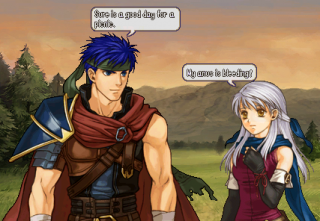
Aside from the support thing, though, Radiant Dawn pulls off a lot of creative ideas really well. I'd go into detail, but the my long blog has already done that. I'll end on this note: contrary to what you've heard, Radiant Dawn is far from the worst Fire Emblem out there. It's definitely not the smoothest game in the series, but it's not as bad as the first half of Monshou no Nazo or The Sealed Sword. In fact, Fire Emblem: Radiant Dawn is good enough to earn the Clairvoyant Obama Award. I know, that sounds incredibly weird, but hear me out. In the incredibly brief second part of the game, Elincia is queen of Crimea, and she's doing a good job. The other nobles don't like her and want her out of office (somehow), but must first tackle the incredibly minor problem of there being nothing wrong with anything whatsoever. Their solution?: Work up the local populace into a rage over absolutely nothing. Sound familiar? No? Well, thanks a lot, stupid; now I have to give the smart people another example because of your stupidity. Stupid. Later in the game, some asshole senators accuse the empress of being fake, having absolutely no basis for their claims. Now? Hell, I wouldn't be surprised if during a very heated debate, all of Congress turned to stone. In fact, I'd describe it with only three words: totally fucking awesome.
Review Synopsis
- It's pretty damn creative and (mostly) tight from a story perspective, but some of the story mechanics awkwardly collide with the gameplay mechanics.
- A lot of what Radiant Dawn does was done in Path of Radiance, but given that its predecessor was really good, I consider that a good thing.
- The characters need some refining, and the support system needs to go back to the GBA goodness.
And with one fell swoop, I beat every Fire Emblem currently made. Or I would have, if Medeus would just shut the fuck up.
Astro Boy: Omega Factor
( There are really only three reasons I played this game.) The first is that I've heard good things about that (and that's always worked, hasn't it?); the second is because there's a new Astro Boy movie coming out, and I'm incredibly opportunistic; thirdly, Mega Man's been ripping Astro Boy off for years, and I wanted to see if the source material is any good. Judging by the game, it is good, even if the air permanently lingered with the smell of McDonald's and lemonade.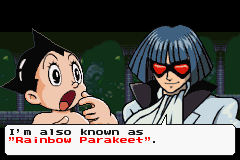
"But what does this have to do with racism", you ask without realizing how rude it is to interrupt my blog. I was getting to that: the previous paragraph denotes only the general backstory of Omega Factor; the actual plot concerns Astro trying to resolve the hatred between robots and humans. Yet unlike Radiant Dawn, where its respective races eventually worked things out, the robots and humans of Omega Factor fuck things up enough to get their planet exploded. Of course, this means nothing for you; since you're so awesome, you get to play the entire game all over again, scrounging every level for some missed secret so you can get a better ending.
Don't get me wrong, Omega Factor is a good game, just not good enough to play twice (especially in that " Rare N64" forced fashion). The game's divided into two types of gameplay: side-scrolling beat em up, and Gradius-esque shooty stages. "Sounds repe-" what did I just tell you about interrupting my blog? Although yes, you do have a point. The gameplay is a bit repetitive, having descended from two gaming genres which specialize in doing the same thing ad nauseam, but it's still fun for a single reason: it's creative. Rather than just walking in a straight line and punching criminals in that line, you have a variety of moves and maneuvers, like kicking things (holy crap!) and, of course, the ability to crap bullets at projectile speeds. Some of them you can pull off immediately, but others require that you satisfy Astro's blood-lust. This is incredibly easy to do, which makes you wonder why they bothered placing a limit in the first place.
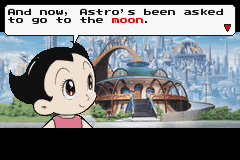
The shooting sections aren't much better; because you're still using Astro, you're limited to one weapon: the finger laser. You still have your blood-lust powers, but that's about it. To make things worse, the laser doesn't have any turbo, so you're forced to mash the B button the entire fight. I know a shooter doesn't need power-ups to be good, but they can't hurt. Wait, that reminded me of something: I originally said that the shooting portions were good. What's so good about a button-mashing shooter with only one weapon? Well, the design; everything about them seems streamlined, from the automatic direction switching to the way enemies and bosses are designed.
Also smooth: the RPG stat thing. Not smooth: that crappy transition. Moving on, what sets Astro Boy apart from other beat em ups and shmups (aside from the pedo vibe) is the weird stat system. Here's how it works: every time Astro meets somebody, he registers their profile on a Chinese chess board/personality chart thing. Somehow, this allows him to upgrade all his weapons and systems. Oh, and a useless sensor stat you'll never use. It may sound weird to use the characters as a source of power, and while that's true, it does open up some interesting possibilities for hunting down hidden characters/unlocking branching storylines in the more non-linear moments of the game. I imagine. Keep in mind I didn't play the new game + thing, mainly because I don't like it when the game forces that crap on me. No means no, Astro Boy. I give you the Irony Award. Ironically, there is absolutely nothing ironic about the award itself. *brain explodes*
Review Synopsis
- I think this is one of the few instances where Chris Hansen would say "You had it coming."
- Generic beat em up+nondescript shooty portions=kickass combo of both? Screw you, math.
- Ass gun. Enough said.